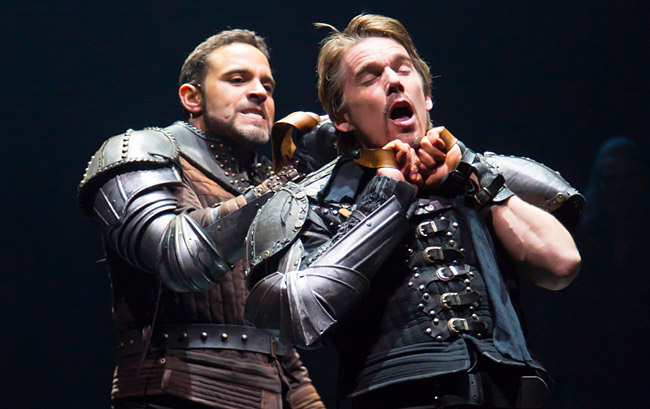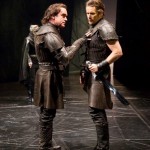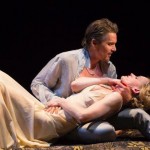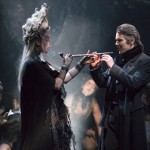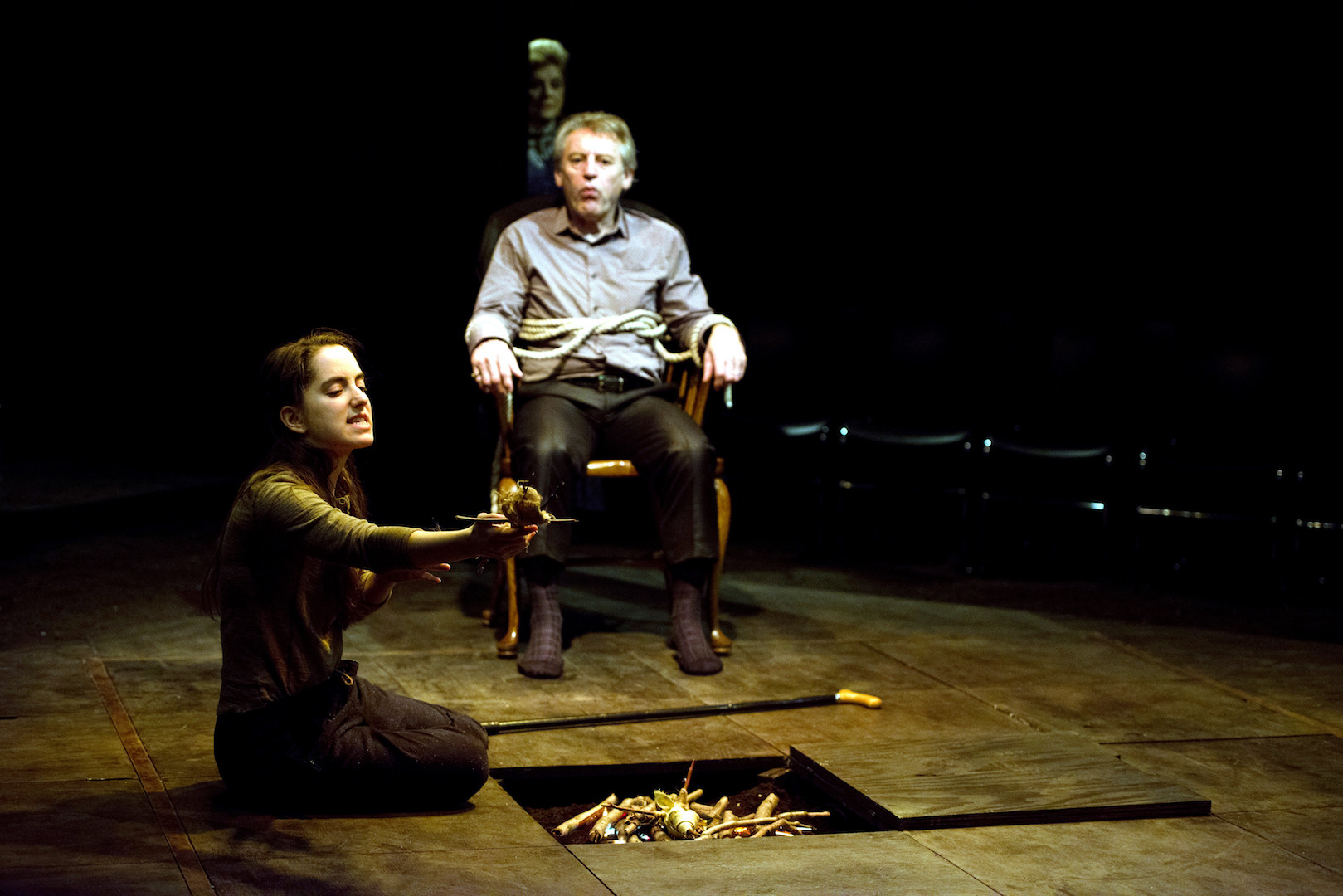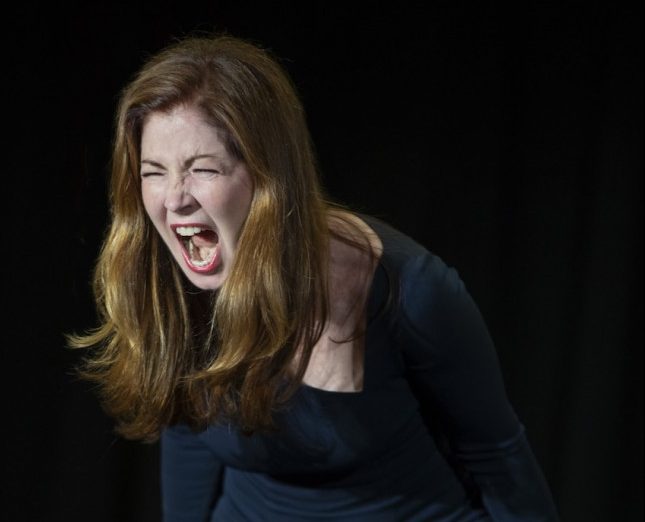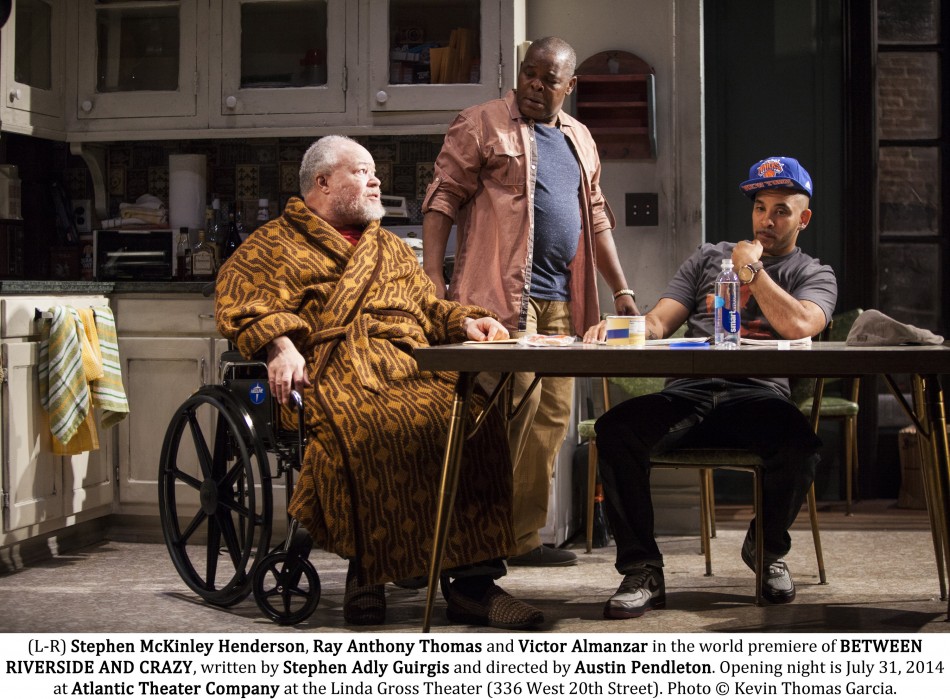by: JK Clarke
Macbeth is not one of Shakespeare’s best tragedies. It lacks the complexity and layers of, say, a King Lear or a Hamlet. Rather, it is a straightforward play about greed and poor decision making. It is more a tragedy in the traditional sense: an individual with enormous potential is brought down by a fatal weakness. Perhaps that, and the fact that it is a beautifully written play with countless memorable and celebrated lines, is why it is also one of the Bard’s more popular works. At last count, there were at least six productions (including two one-man performances) of Macbeth this year in New York City. The latest is produced by Lincoln Center Theater and directed by Jack O’Brien, whose Coast of Utopia trilogy won the Tony for Best Play in 2007.
This is a dark, mystical and foreboding production. O’Brien, along with set designer Scott Pask, uses the enormous and technically magnificent Vivian Beaumont stage to overwhelming effect. Characters frequently feel far-away or dwarfed by the black space above and around them. And rightfully so: the three Weird Sisters (or witches) and their dark dominion (creeping creatures that look like strays from the set of Cats) dominate the play. They are fates, of sorts, manipulating the actions of the characters in their story. It is they who set events in motion by baiting Macbeth with the notion that he will one day be King. Not only do we see the weird sisters in their scripted scenes, but they are constantly hovering about on stage, with their long grey hair, beards, and flowing black, semi-militaristic garb. They are sly, peevish gremlins, manipulating scenarios and creating chaos. At times they will inhabit the soul of an unsuspecting character, returning him to his body at the end of a scene. The masterful John Glover, as one of the three witches, is truly magnificent and soars above the entire production. His witch is overjoyed with the madness and destruction “she” has created, and struts before the audience, preening and winking, ever so proud of herself. It is the Witches’ show, and Glover is the star.
O’Brien has cast two of his actors from The Coast of Utopia to be his kings. Short-lived Duncan (Richard Ellis), despite the severity with which he deals with his enemies, is a benevolent, smiling old regent, happy in his rule. So his murder at the hands of his hosts, Macbeth (Ethan Hawke) and his wife, is a rather ungracious and unexpected schism of hospitality. Hawke’s Macbeth is a warrior who rules on the battlefield, but is politically impotent. Pushed and prodded by Anne-Marie Duff’s powerful and intense Lady Macbeth, he allows himself to make an incredibly poor and fateful decision. “If we should fail?” he asks his co-conspirator wife. “We fail? But screw your courage to the sticking place/And we’ll not fail,” she baits. He’s too much a warrior to be called a wimp by her. A doer, not a thinker. But when everything has unraveled, and they both have had a crisis of conscience, we see a passive man who knows he’s doomed. Hawke’s “Tomorrow and tomorrow and tomorrow,” speech is not the usual plaintive wail, but rather the exasperated whimper of a hollow man. He plays his Macbeth as introspective and ambivalent, not outwardly crazed (though occasionally manic and frenzied), which helps us see inside his tragic flaw.
Other flourishes ignite the production: Catherine Zuber’s costumes are not mired in any era. They run the gamut from medieval leather armor to 19th century formal wear to Lady Macbeth’s contemporary cocktail gown, with swooping curves and elegant flow. What the garments have in common is style and purpose. And, the cast is buffeted by Daniel Sunjata as the avenging, cesarean-born Macduff. He is a force to be reckoned with, and there’s never any doubt he’s going to put an end to all the madness, treason and chaos.
O’Brien’s unusual decision to make the Weird Sisters the focus of this production is welcome and well-executed. The Scots in question are manipulated like puppets and made to play against their own purpose, much to their apparent bewilderment. It is only the mighty resolve of the pure of heart and purpose that re-settles the stage, casting aside the poisonous augurs. If only for a little while.
Macbeth. Through January 12 at the Vivian Beaumont Theater, Lincoln Center. www.lct.org
*Photos: T. Charles Erickson


